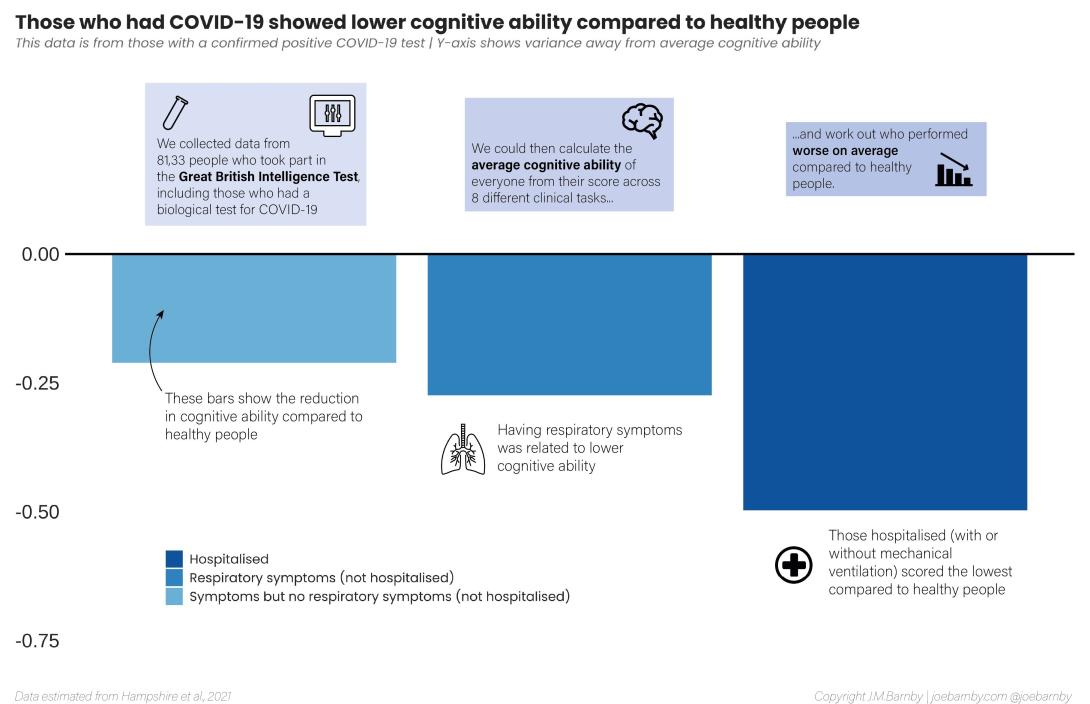Published in the scientific journal EClinicalMedicine, the recent study involving over 80,000 individuals provides evidence of acute problems with thinking and attention in people who have recovered from Covid-19.
Supported by the UK DRI and led by Dr Adam Hampshire, UK DRI Associate member based at Imperial College London, the findings suggest more severe Covid-19 symptoms lead to lower scores achieved on a series of online tests, with performance on reasoning and problem-solving tasks being most affected. Further analysis of the data indicates that those who received mechanical ventilation to help them breathe whilst in hospital show the greatest impairment on cognitive tasks.
Gathering data with online cognition tests
Developed by Dr Hampshire, a series of online tests were launched to the general public just before the pandemic for the BBC2 Horizon’s Great British Intelligence test. In early 2020, the study team extended the questionnaires to gather information on SARS-CoV-2 infection, the symptoms experienced and the need for hospitalisation.
Out of the 81,337 who provided complete data, 12,689 people suspected they had Covid-19. Participants reported a range of severity of illness, with many experiencing respiratory symptoms whilst still being able to stay at home (3,559 participants). Nearly 200 were hospitalised (192 participants) and about a quarter of these (44 participants) required mechanical ventilation.
The time since illness onset was around 1-6 months, meaning the study could not draw any definitive conclusions about whether these effects on cognition were long-lasting.
Thinking problems and respiratory symptoms
The study found a relationship between deficits in overall cognitive performance and severity of respiratory symptoms experienced, although not all areas of thinking ability correlated with Covid-19 severity in the same way. Some abilities were spared including emotional discrimination (recognition of faces that were expressing the same emotion) and working memory (remembering where a sequence of squares appears on the screen). In comparison ‘executive’ tasks that required skills in reasoning, for example, deciding if relationships between words were similar, and problem solving, for example, working out how many moves it would take to go from one arrangement to another, appeared to show the greatest deficit.
To understand the size of the deficits the authors compared the pattern of scores on the tests to cognitive changes that occur for other reasons. The effects in people hospitalised with mechanical ventilation were similar to the average cognitive decline seen over a period of ten years of ageing and equivalent to a seven-point difference in IQ. In another recent study using this cohort, Dr Hampshire identified wide-ranging positive and negative impacts of the early pandemic on mental health and well-being in the UK.
Study Lead, Dr Adam Hampshire, from the Department of Brain Science at Imperial College London, and Associate Member of the UK DRI said:
“Our study adds to an increasing body of research that is looking at different aspects of how Covid-19 might be impacting the brain and brain function. This research is all converging to indicate that there are some important effects of Covid-19 on the brain that need further investigation. Going forward it would be valuable to bring together brain imaging and cognitive tests with other information on mental health and everyday function, ideally in studies that track peoples' trajectories for months or even years. To really know what the long-term effects are for people will require people to be followed up over time.”
Dr Hampshire is an Associate Member supporting the UK DRI Care Research and Technology Centre led by Prof David Sharp. A leader in design and development of behavioural diagnostics, his involvement in the work of the Centre facilitates the development of standardised assessments of cognition that can be scaled to large populations, helping us uncover how the brain changes in healthy ageing and dementia.
New studies, such as COVID-19 Clinical Neuroscience Study (COVID-CNS), led by King’s College London and University of Liverpool and the REACT Long COVID study, led by Imperial College London, are now applying these cognitive tools to study the long-term impacts of Covid-19.
<p>members of the public contributed to the study</p>

Ruling out other explanations
The researchers carried out a series of checks to ensure these cognitive deficits were associated with Covid-19 and not caused by other factors. These included separating out people who had a confirmed positive test for SARS-CoV-2 and demonstrating that the cognitive deficits were indeed greater in those with positive tests. Further checks suggested the results were not due to a minority with pre-existing conditions or on-going symptoms of Covid-19. Analysis also indicated that it was unlikely that the results could be explained by the fact that those who contracted more severe disease were less cognitively able before they were ill.
Senior author on the study Mitul Mehta, Professor of Neuroimaging from King’s College London, said:
“A critical question remains as to why some cognitive functions are more affected than others. It is already known that hypoxia and mechanical ventilation are associated with cognitive deficits similar to those observed in this study, and there is now evidence of neurological complications in some patients, as well as psychiatric consequences. As we are coming through the third wave of the pandemic, there are more available options that can reduce the severity of Covid-19 such as vaccination and effective treatments whilst in hospital. The findings from this study suggest that by reducing the severity of illness through these different approaches we may also be able to reduce the severity of cognitive difficulties people may experience.”
This research is a collaboration between King’s College London, Imperial College London and the University of Cambridge. It was part-funded by the UK DRI's Care Research & Technology Centre and the National Institute of Health Research (NIHR) Maudsley Biomedical Research Centre.
Reference
Article published: 12 August 2021
This article was repurposed from the original news with permission from the NIHR Maudsley Biomedical Research Centre.
Banner image: MIAstudio/shutterstock.com
